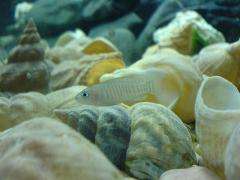The importance of being helpful -- Cooperative cichlids boost their own reproductive success

Subordinate individuals living within a group of vertebrates sometimes assist a more dominant pair by helping to raise the dominant pair's offspring and this has been shown to occur among subordinate female cichlids. Reporting in the online, open-access, peer-reviewed journal PLoS ONE, Dik Heg and colleagues at the University of Bern, Switzerland, and the Ohio State University, suggest that rather than engaging in an act of reciprocal altruism, these subordinate females actually benefit from the care-giving they offer as the more helpful subordinates are more likely to reproduce.
A number of hypotheses have been proposed to explain why subordinate female cichlids (Neolamprologus pulcher) often help to raise the offspring of unrelated dominant females (a form of alloparental care). Studying small groups of unrelated individuals, Heg and colleagues found no evidence that the helping behaviour of the subordinates was an example of reciprocal altruism, even though opportunities for reciprocation among cichlids are high, as the females lay eggs about every second week—there was no correlation between the amount of care that dominants provided for their subordinates' broods and subordinates' alloparental care for dominants' broods.
The results of the PLoS ONE study suggest that while reciprocal altruism doesn't occur, the subordinate cichlids did receive reciprocal benefits in exchange for the care they provided for the offspring of dominant pairs—a behaviour that enhanced their own chances of successfully reproducing. More specifically, a subordinate's helping behaviour ensures she gains access to the breeding substrate, on which she lays her eggs.
Heg and colleagues show that subordinates may be prepared to increase their care "payments" in return for enhancements in their own current reproductive potential (which they call the "pay-to-reproduce" hypothesis). Finally, subordinates may adjust their level of help according to parentage, at least in females
The authors suggest that this finding may also apply to other species, such as the female yellow-bellied marmot, which also adjusts its social behaviour largely to get access to direct reproduction.
More information: Heg D, Jutzeler E, Mitchell JS, Hamilton IM (2009) Helpful Female Subordinate Cichlids Are More Likely to Reproduce. PLoS ONE 4(5): e5458. doi:10.1371/journal.pone.0005458, dx.plos.org/10.1371/journal.pone.0005458
Source: Public Library of Science (news : web)















